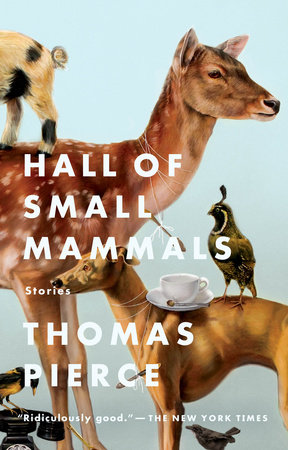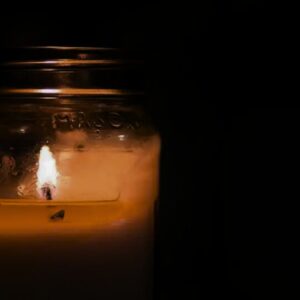The zoo, finally, was going to let the public see its baby Pippin Monkeys.
“I bet we won’t be able to get very close,” Val said. Like always, he had on his blue backpack, the one that contained what I understood to be his novel‑in‑progress, plus his supply of granola bars, arrowroot cookies, popcorn, and insulin injections. The water bottle clipped to the side of the backpack was metal and shiny in the cloudless afternoon heat. Val was my girlfriend’s twelve-year-old son, and I wanted him to like me.
We were at the back of a very long line that began near the Panda Plaza and wound all the way around the Elephant House. Nobody was very interested in the elephants or the pandas at the moment. Everyone was at the zoo for the baby Pippins. If just one of the three Pippin Monkeys survived to maturity, it would apparently be a major feat for the zoo, since no other institution had been able to keep its Pippins alive for very long in captivity. The creatures came from somewhere in South America. They were endangered and probably would go extinct soon. But before they did, Val wanted to see one up close: the gray fuzzy hair, the pink face, the giant empty black eyes. Val wanted to take a picture to show his friends.
“I can turn off the flash,” he said, messing with his camera phone. We had just passed a sign that banned all photography once we were inside the Hall of Small Mammals, where the Pippins were on display for one weekend only. “No one will notice,” he said.
“Just be covert about it,” I said, though I didn’t really approve. Generally I don’t condone rule-breaking of any kind. I’ve always been this way. At the airport, when there’s a line roped off for the check‑in counter, I will walk the entire maze, back and forth, even if I’m the only one there to see me do it. If my car barely protrudes into a nonparking zone, I will drive for miles in search of another spot.
Val tapped his sneaker on the asphalt, steaming from the earlier spray of the sprinklers. By this point we’d been waiting for almost an hour and had not even passed the Elephant House. I tugged my shirt off my sticky back to let in some air. Directly behind us in line, a man with a comb-over fished around in his neon green fanny pack and produced two Wetnaps, one for himself and one for his wife, a somber-looking woman in a zebra-print dress that I gathered she had picked out specifically for this excursion. I watched them unfold their antibacterial napkins with care and scrub every inch of their hands— palms, fingers, creases, wrinkles, even up past the wrists. Watching them groom was exhausting. All of this was exhausting.
I was ready to give up and go home, but, ever since seeing the color photo of the Pippins in the magazine insert of the Saturday newspaper, Val had talked about little else. It would make him so happy, his mother had said. Val had studied up on Pippins and knew all there was to know about their tool-making intelligence and diet, about the destruction of their leafy forest home in wherever‑it‑was, about the mysterious malaise that overcame captive Pippins and made reproduction difficult and rare. Frankly, I didn’t want to hear any more about the godforsaken Pippins.
“So,” I said, trying not to sound bored, “tell me about your novel.” Val looked up at me like I’d just asked him to squash the family hamster.
“First of all,” he said, “it’s not a novel. It’s a screenplay.”
“Oh,” I said. “Sorry, I was under the impression it was a novel.” I didn’t tell him that his mother had more than once referred to it as Val’s not‑so‑secret secret novel. “What’s it about?”
The boy sighed. “Okay,” he said. “So what do you know about sensory deprivation?”
I admitted that I knew very little about sensory deprivation.
“Well, you probably won’t get it, then,” he said, and writhed loose from his backpack straps. He took out a granola bar and his insulin kit and then handed me the pack like I was his personal valet, which in a way I suppose I was. “I need to go do this now,” he said. “Don’t get out of line. I’ll be right back.”
I watched him waddle off toward the bathrooms taking big bites of the bar. Maybe it was his flat dry hair or his tube socks or his white hairless legs, but Val already had the look of a middle-age government employee. I saw nothing of his mother in him, so he must have resembled his father, a man who lived in the same city but whom I’d never met and never would. I’d been dating Val’s mother for only a few months. She worked in the same building as me but for a separate company. Her department did something that involved cardboard tubes. The tubes were different sizes and lengths and colors. They leaned against all the walls and desks on her floor. She didn’t enjoy discussing her work. “That’s not who I am,” she’d say. By the time we broke up, not long after my visit to the zoo with Val, I still hadn’t figured out if her company shipped the tubes or received them or made them or what.
The couple behind me in line was getting impatient.
“This is ridiculous,” I heard the man say. “They have a responsibility to keep the line moving, don’t they? How much time do you need in there? One look and go.”
The woman examined her zoo map, did some calculations on it with a pen from her purse. “We started here and now we’re here,” she said. “That’s about two hundred feet. Divide by the time, and we’re moving at a rate of”—she scribbled—“three feet per minute.”
“And,” the man said, “so what?”
“That means we should be there in”—she scribbled some more—“seventy-two minutes. At this current rate, I mean.”
“Is that supposed to make me feel better?” the man asked.
I had to agree with the man. Seventy-two minutes was a lifetime. I checked my watch as we shuffled forward. The zoo would close its gates in two hours. The sprinklers came back on outside the Elephant House ahead of us and large misty clouds floated over the ferns along the walkway, giant ferns with long, sweeping fronds that knocked against the shoes of the few people on their way to see the elephants. I searched Val’s backpack for some hard candy. He had some peppermints and half a bag of peach lozenges, and I helped myself to a handful of those. I also couldn’t resist looking at his screenplay. I suppose that’s why, really, I’d opened the bag in the first place. Just to have a quick peek. I didn’t have to take out the pages to read them. Somehow that made it feel like less of a violation.
The title page said Prehistory X by Valentine Creel, and it had his home address at the bottom. The story was about time travel, that much I could see right away. Val’s hero was the son of am famous scientist, who in the first scene turned up dead in her lab. I gathered that by using a sensory deprivation tank the hero’s mother had figured out a way to move through time with her mind. Soon, using his mother’s copious notes, the hero was whipped back to the Bronze Age, a scary place populated by gruesome men with painted faces and women with large “cannonball” breasts. Miraculously everyone spoke English. The villain was some sort of tribal chieftain who was holding the mother captive. Yes, she was still alive. I no longer remember how Val explained it scientifically but I think it involved a disembodied mind, forever lost in time.
“Give me some skin,” the villain said at one point, spear raised. The line stuck out because it was something I often said to Val, ironically, palm raised for a high five, though of course in the context of this scene, the line must have had a different, more ominous meaning. Prehistory X was not very subtle in its intentions. I had no trouble working out what was going on. The villain was me, clearly, and I was probably going to die before the end of the movie. I should have hated the script, I suppose, but partly I was honored to be included at all.
“I think the pace is picking up,” the woman behind me said, and when I looked up, I saw that she was right. We were really moving now. I could see the entrance to the Hall of Small Mammals, its brown double doors open wide to receive us. But where was Val? I scanned the crowds. Had I been wrong to let a twelve-year-old go off on his own at a public zoo? I was beginning to suspect that I’d made a poor decision. My experience with children was and is fairly limited. I have two nieces that I rarely see in person, though my fridge is plastered with their childhood photos and printed emails. My older brother, the girls’ father, once said that being a parent is the most important thing he’s ever done with his life. I’ve never had the nerve to ask him what that says about my life.
“Here we go,” the woman said. “I can’t wait. I’ll bet they are so adorable. I wish we could touch one.”
I stepped out of line and gazed back at the man and woman and all the people behind them. I didn’t see any sign of Val. He’d been gone for more than twenty minutes.
“Would you mind holding my place?” I asked the couple.
The woman said of course they wouldn’t mind, but my request agitated the man. He rotated his fanny pack from right to left hip. “Well,” he added, “we can try.”
I set off for the bathrooms with Val’s blue backpack over my shoulder. Children streamed by eating cotton candy and peanuts and hugging plush animal toys—pandas and giraffes and hippos. Before the Elephant House, I turned left up the paved path to the Hall of Great Apes, just in case Val had gotten distracted. Overhead, along cables that connected the Ape Hall to what looked like a cell phone tower, an orangutan bounced up and down on the lines. Long sinewy muscles, pouting mouth, thin orange hair—the orangutan had the look of an aging body builder, a creature long past his prime but presiding over the crowds from his cables. He tracked my progress toward the door.
With everyone in line for the Pippins at the Hall of Small Mammals, I was alone with the bigger apes. In the first room, behind a wall of glass, five well-mannered chimpanzees played sluggishly in stooped fake trees. They regarded me coolly. In the next room, I discovered the Gibbon Monkeys, white and shiny coats, all of them silent and unblinking. In the final room were the Orangutans. Three sat in some straw on the concrete floor, shoulders hunched, a semicircle. Had one of them thrown down an Ace of Spades and said, “Read ’em and weep,” I wouldn’t have been much surprised. From a shaft at the top of the enclosure, a fourth orangutan descended on a network of metal crossbars. He was the one I’d seen outside, and sure enough, he sat apart from the others, chin jutting out, eyes recessed in his wrinkled face, cheek pads gray, cracked, and bulging. He wasn’t staring right at me. It was more unsettling than that. He was more like someone you see out at dinner one night whom you almost recognize, the person who keeps sneaking glances at you over the wine menu, a don’t‑I‑know-you-from-somewhere expression on his face. One solitary creature regarding another, I guess you could call it.
I didn’t linger. I couldn’t. Val was not in the Hall of Great Apes. My detour had been another bad decision. I was beginning to panic. I imagined the boy in the trunk of a kidnapper’s car, red brake lights across his helpless, tear-streaked face. I imagined him convulsing on a stretcher in the back of an ambulance, the oxygen mask over his mouth. I walked faster. Maybe the zoo was going to have to make one of those announcements over the loudspeaker that has shamed so many parents over the years, but in the end, Val was the one who found me.
“What are you doing?” he asked. He’d run up behind me, his glasses slightly skewed, hair wet in front.
“I was looking for you,” I said. I was relieved but also a little irritated to see him again.
“Just great,” he said. “Wonderful. I leave you alone for ten minutes. Was I not clear enough? Didn’t I tell you not to get out of line?”
I admitted that yes, those had been his instructions, but I’d had my reasons for disobeying. He was only twelve after all and as his guardian for the day, my first responsibility was his safety and not holding his place in line. Hearing this sent Val into a rage. He called me useless. He called me hopeless and worse. He spoke with such authority that I almost believed he was right. When he grabbed his backpack from me and started back toward the Hall of Small Mammals, I fell into step behind him.
“Actually,” I called up to him when I remembered it, “someone is holding our place.” If Val heard me, he gave no indication. His blue backpack was flush against his neatly pressed short-sleeve checkered shirt. He stomped ahead, resolute, tight pink corpuscle fists at his side, thumbs jammed through his belt loops. When we got to the Hall, the couple holding our place had already gone inside. Val was two seconds behind me in putting it together. I had no idea what to do next, and Val despaired.
“You do realize this is a limited-time exhibit?” he said.
Not for the first time Val’s obsession with these creatures was beginning to bother me. What was so fascinating about them? Even if they all died out one day, we still had plenty of other monkeys to admire—Spider Monkeys, Squirrel Monkeys, Marmosets, and Howlers. I found it difficult to care much about an animal with so little regard for itself and for the survival of its own speciesthat scientists had been forced to extract semen from unwilling males for insemination in the unwilling females. I wasn’t going to miss the Pippins when they disappeared from the earth. But I suggested to Val that we get back in line. Maybe the zoo would stay open late to accommodate all the extra people. He was doubtful but agreed that we should at least try. We turned to walk, and just when I thought I’d finally brought him around to my side again, a zoo official in khaki duds came out of the Hall of Small Mammals. He was a short, plump man with messy dark hair. He counted off twenty people—“One, two, three,” his finger pointing—and then announced that everyone else was out of luck.
“I’m sorry,” he said over the groans and complaints, “but that’s the way it is.”
The crowd began to disperse, grumbling. Val was not dissuaded. He got in line behind the twentieth person.
“Sorry, buddy,” the official said to him. “Only these twenty. Line has to end somewhere.”
“Right,” Val said, “and it ends behind me.” Perhaps assuming I was the one in charge here, the zoo official appealed to me for help. Do something about your kid, his face said. But I had no intention of getting involved. I didn’t budge or say a word.
“Listen,” the zoo official said. “I get it, kid, I really do, but you have to understand that I just turned away a hundred people. If I break the rules for you, then where does it end?”
“With me,” Val said, arms crossed, mouth so tight and dense it exerted a gravitational pull on the rest of his face. He was even bold enough to meet the man’s gaze. They locked eyes and stood there, two angry mannequins.
The official was the first to look away. He turned sideways and scratched behind his red ear. I thought maybe he’d given up, but he hadn’t. “No,” he said, and stepped into line ahead of Val. “The line ends here.”
“Get out the way,” Val said, and tugged at the man’s arm, and for the first time in this exchange, he gazed over at me. I could see how upset and desperate Val was. He seemed to be on the verge of tears, though whether or not those tears were strategic, I wasn’t entirely sure. Anything was possible with this kid. But I sensed an opportunity. Maybe the tribal chieftain wouldn’t have to die at the end of Val’s movie after all. Maybe he wouldn’t even have to be the bad guy.
If you’d asked me then why I cared so much about what happened with Val and why I wanted him on my side, I probably would have lied and said I didn’t care one iota. It wasn’t as though I was in love, and I certainly didn’t have plans to stick around for the long haul. Val’s mother was beautiful though a bit uptight and officious. I recall one night, especially, when she insisted on super-gluing back together an entire stained-glass lamp we had accidentally rocked off the nightstand, a project that required hours of Zen-like concentration on her part and bored me enough to turn on the television. Plus, I’d never dated a woman with a kid, and she was reluctant to leave Val with a babysitter for more than a night or two a week, which seems more admirable to me now than it did at the time. I was suspicious of Val’s complete lack of interest in me. I worried he was bad-mouthing me when I wasn’t there. That’s why I’d volunteered for the zoo trip, of course.
I’ve long been something of a serial dater, I’m the first to admit that, and I do have a bad habit of giving up at the first hint of difficulty or complication, but I don’t believe in regret. I believe it’s important to face forward. And yet, sometimes I do find myself thinking about Val and his mother, curious about the course of their lives after I moved on. What are the chances that Val, wherever he is, still thinks about our day together at the zoo?
“Now, wait a minute,” I said to the official. “Wait. Can we talk for a minute?”
He pretended not to hear me, but a few other people ahead of him in line turned to see what all the commotion was about. I slipped my hand into my back pocket and felt for my wallet but didn’t take it out yet. “We’ll follow the rules,” I told the official, “but first just talk to me. Okay? Just hear me out.”
“What do you want to talk about?” he asked.
“Talk to me over here,” I said. “Please.”
Reluctantly he stepped out of line and toward me, one hand in his pocket, the other scratching his red ear again. I wondered if it was infected. “You need to get a handle on your kid,” he said quietly.
“I know,” I said, wallet out of my pocket. “You’re absolutely right. But listen, the thing is, he’s not even mine. He’s my girlfriend’s kid, and I won’t lie to you. He can be a real pain in the ass, okay? The other night I caught him spitting in my red wine. He hates me, okay? But listen, he’s got to see these monkeys. If you don’t let him—” I handed him two twenties. “If you don’t, I’ll never hear the end of it. Please, help me with this.”
The official shoved the money back at me. “No, no, that’s not what this is about,” he said.
“Then what is it about?” I asked.
“It’s about respect. He doesn’t have any.”
While that was true, I wasn’t going to say so to this guy. I needed a different approach and quickly settled on pity. “This isn’t his fault,” I said. “I’m the one who lost our place in line. No need to punish him, right?”
The official didn’t say anything.
“The kid has problems, okay?” I continued. “He’s a sick kid. Check his backpack. He has to carry around his medication. He has to give himself shots, all right? I’m pretty sure that’s why he wants to see these baby monkeys. I think he relates to them on some level.”
The official’s ear was so red I thought it would burst open. He stopped scratching it and considered this new information.
“What’s wrong with him?” he asked.
As far as I was aware, diabetes was the extent of it, but I told him it was lots of things, that I couldn’t say exactly what it was because his mother didn’t like for me to talk about it, but it was bad.
The official shook his head back and forth, his mouth a rigid line. “Regardless, he needs to apologize,” he said.
“Yes, of course,” I said. “Definitely.”
We walked over to Val, who had never abandoned his place in line.
“Val, apologize to this gentleman,” I said.
Val was about to say something—something offensive, I was sure of it—so I made a face that I hoped he would understand, my eyes wide, lips pursed. He fidgeted with his backpack straps, uncertain.
“Okay,” he said, and looked up at the official. “Sorry. I am. I was just excited.”
The official nodded and said, “You can’t just go around doing whatever you want to do. That’s not how life works.”
Val didn’t respond. This was a lesson that he probably needed to learn, and now, because of me, maybe he never would. He looked up at both of us with the same cool stare, waiting to see if he was going to get what he wanted, and of course he did.
“He can go in,” the zoo official said, then turned to me. “But just him. You’ll have to wait outside.”
“Why?” I asked. “We’re together.”
“Take it or leave it,” the man said. “I’m only letting in one more person. You or him. Up to you.”
Val looked up at me victoriously, apparently not doubting that he’d be the one to go inside. That’s the way it is with kids, I suppose: they take it for granted that the last cookie on the tray is for them. I told the guard thank you, though I suspected this was all his way of clinging to the little bit of authority he had left. He was being petty, but I let it slide and took my place beside Val. A few people tried to join the line after that, but the official shooed them away. He brought over an orange cone and dropped it directly behind us. Val watched that procedure closely, happy of course to be on the right side of it. If the boy had any new respect for me, he certainly didn’t show it.
“I’m glad it’s working out,” I said, and raised my hand unconvincingly for a high five. But Val didn’t want to meet my hand up high. He stuck his palm out low, and when I tried to slap it, he snatched it away at the last second.
“I’m still sensing some hostility,” I said, trying to be funny, and, in the absence of any laughter, mine or his, feeling more upset. “To be perfectly honest, I wouldn’t mind a little more appreciation, pal. I just got you into this party.”
“Thanks for that,” he said. He was such an easy kid to dislike. He got out his phone and double-checked that the flash was disabled. We were quiet until, finally, it was his turn to enter the Hall. Inside I could hear a movie presentation about the Pippins, the narrator’s British accent. Cool air gushed out of the dark hall in powerful and pleasant waves. It felt wonderful and inviting. I still had no love for the poor baby Pippins, but I wouldn’t have minded seeing what all the fuss was about.
The zoo official was holding open the door with his back, his hand on the horizontal bar, ready to swing it shut behind Val. Without exactly intending to, I’d come very close to the entrance. For a moment I wondered if he was actually going to let me pass as well, if maybe he had forgotten or no longer cared about this part of our agreement. But as I approached, he shot me a hard look, almost daring me to take another step, and I knew that if I pressed forward, he would stop me, or possibly even the both of us. Val shoved his backpack in my direction as though to prevent me from trying.
“Don’t lose this,” he said. I watched him go forward, hands deep in his pockets, and then pass through the door alone. He didn’t turn back to say Thank you or I’ll see you on the other side or anything else. He acted like I wasn’t even there, like he’d already forgotten me.
From HALL OF SMALL MAMMALS. Used with permission of Riverhead Books. Copyright © 2015 by Thomas Pierce.













